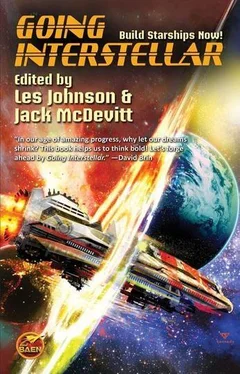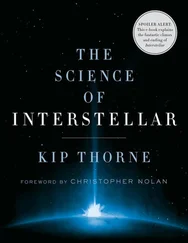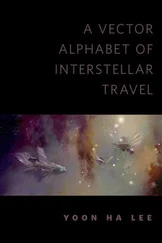Gregorian was moderately handsome and rather tall, quite slim, with thick dark hair and laugh crinkles at the corners of his dark brown eyes. Ignatiev tended to think of people in terms of chess pieces, and he counted Gregorian as a prancing horse, all style and little substance.
“I am flight systems engineer, no?” Gregorian countered. “My assignment is to monitor the flight control program. That makes me the pilot.”
Nikki, still beaming at him, said, “If you’re the pilot, Vartan, then I must be the navigator.”
“Astrogator,” Ignatiev corrected bluntly.
The daughter of a Quebecoise mother and French Moroccan father, Nicolette Denueve had unfortunately inherited her father’s stocky physique and her mother’s sharp nose. Ignatiev thought her unlovely—and yet there was a charm to her, a gamine-like wide-eyed innocence that beguiled Ignatiev’s crusty old heart. She was a physicist, bright and conscientious, not an engineering monkey like the braggart Gregorian. Thus it was a tragedy that she had been selected for this star mission.
She finally turned away from Gregorian to say to Ignatiev, “It’s good to see you, Dr. Ignatiev. You’ve become something of a hermit these past few months.”
He coughed and muttered, “I’ve been busy on my research.” The truth was he couldn’t bear to be among these youngsters, couldn’t stand the truth that they would one day return to Earth while he would be long dead.
Alexander Alexandrovich Ignatiev, by far the oldest man among the starship’s crew, thought that Nikki could have been the daughter he’d never had. Daughter? he snapped at himself silently. Granddaughter, he corrected. Great-granddaughter, even. He was a dour astrophysicist approaching his hundred and fortieth birthday, his short-cropped hair iron gray but his mind and body still reasonably vigorous and active thanks to rejuvenation therapies. Yet he felt cheated by the way the world worked, bitter about being exiled to this one-way flight to a distant star.
Technically, he was the senior executive of this mission, an honor that he found almost entirely empty. To him, it was like being the principal of a school for very bright, totally wayward children. Each one of them must have been president of their school’s student body, he thought: accustomed to getting their own way and total strangers to discipline. Besides, the actual commander of the ship was the artificial intelligence program run by the ship’s central computer.
If Gregorian is a chessboard knight, Ignatiev mused to himself, then what is Nikki? Not the queen; she’s too young, too uncertain of herself for that. Her assignment to monitor the navigation program was something of a joke: the ship followed a ballistic trajectory, like an arrow shot from Earth. Nothing for a navigator to do except check the ship’s position each day.
Maybe she’s a bishop, Ignatiev mused, if a woman can be a bishop: quiet, self-effacing, possessing hidden depths. And reliable, trustworthy, always staying to the color of the square she started on. She’ll cling to Gregorian, unless he hurts her terribly. That possibility made Ignatiev’s blood simmer.
And me? he asked himself. A pawn, nothing more. But then he thought, maybe I’m a rook, stuck off in a corner of the board, barely noticed by anybody.
“Dr. Ignatiev is correct,” said Gregorian, trying to regain control of the conversation. “The proper term is astrogator.”
“Whatever,” said Nikki, her eyes returning to Gregorian’s handsome young face.
“Young” was a relative term. Gregorian was approaching sixty, although he still had the vigor, the attitudes and demeanor of an obstreperous teenager. Ignatiev thought it would be appropriate if the Armenian’s face were blotched with acne. Youth is wasted on the young, Ignatiev thought. Thanks to life-elongation therapies, average life expectancy among the starship crew was well above two hundred. It had to be.
The scoopship was named Sagan , after some minor twentieth-century astronomer. It was heading for Gliese 581, a red dwarf star slightly more than twenty light years from Earth. For Ignatiev, it was a one-way journey. Even with all the life-extension therapies, he would never survive the century-long round trip. Gregorian would, of course, and so would Nikki.
Ignatiev brooded over the unfairness of it. By the time the ship returned to Earth, the two of them would be grandparents and Ignatiev would be long dead.
Unfair, he thought as he pushed himself up from the plush banquette and left the lounge without a word to either one of them. The universe is unfair. I don’t deserve this: to die alone, unloved, unrecognized, my life’s work forgotten, all my hopes crushed to dust.
As he reached the lounge’s hatch, he turned his head to see what the two of them were up to. Chatting, smiling, holding hands, all the subverbal signals that lovers send to each other. They had eyes only for one another, and paid absolutely no attention to him.
Just like the rest of the goddamned world, Ignatiev thought.
He had labored all his life in the groves of academe, and what had it gotten him? A membership in the International Academy of Sciences, along with seventeen thousand other anonymous workers. A pension that barely covered his living expenses. Three marriages: two ruined by divorce and the third—the only one that really mattered—destroyed by that inevitable thief, death.
He hardly remembered how enthusiastic he had been as a young post-doc all those years ago, his astrophysics degree in hand, burning with ambition. He was going to unlock the secrets of the universe! The pulsars, those enigmatic cinders, the remains of ancient supernova explosions: Ignatiev was going to discover what made them tick.
But the universe was far subtler than he had thought. Soon enough he learned that a career in science can be a study in anonymous drudgery. The pulsars kept their secrets, no matter how assiduously Ignatiev nibbled around the edges of their mystery.
And now the honor of being the senior executive on the human race’s first interstellar mission. Some honor, Ignatiev thought sourly. They needed someone competent but expendable. Send old Ignatiev, let him go out in a fizzle of glory.
Shaking his head as he trudged along the thickly carpeted passageway to his quarters, Ignatiev muttered to himself, “If only there were something I could accomplish, something I could discover, something to put some meaning to my life.”
He had lived long enough to realize that his life would be no more remembered than the life of a worker ant. He wanted more than that. He wanted to be remembered. He wanted his name to be revered. He wanted students in the far future to know that he had existed, that he had made a glowing contribution to humankind’s store of knowledge and understanding. He wanted Nikki Deneuve to gaze at him with adoring eyes.
“It will never be,” Ignatiev told himself as he slid open the door to his quarters. With a wry shrug, he reminded himself of a line from some old English poet: “Ah, that a man’s reach should exceed his grasp, or what’s a heaven for?”
Alexander Ignatiev did not believe in heaven. But he thought he knew what hell was like.
As he entered his quarters he saw that at least the cleaning robots had finished and left; the sitting room looked almost tidy. And he was alone.
The expedition to Gliese 581 had left Earth with tremendous fanfare. The first human mission to another star! Gliese 581 was a very ordinary star in most respects: a dim red dwarf, barely one-third of the Sun’s mass. The galaxy was studded with such stars. But Gliese 581 was unusual in one supremely interesting way: it possessed an entourage of half a dozen planets. Most of them were gas giants, bloated conglomerates of hydrogen and helium. But a couple of them were rocky worlds, somewhat like Earth. And one of those—Gliese 581g—orbited at just the right “Goldilocks” distance from its parent star to be able to have liquid water on its surface.
Читать дальше












